第38章
It is proposed to you that you mount a horse, you must absolutely make a choice, for it is quite clear that you either will go or that you will not go.There is no middle way.It is therefore of absolute necessity that you wish yes or no.Up to there it is demonstrated that the will is not free.You wish to mount the horse; why? The reason, an ignoramus will say, is because I wish it.This answer is idiotic, nothing happens or can happen without a reason, a cause; there is one therefore for your wish.What is it? the agreeable idea of going on horseback which presents itself in your brain, the dominant idea, the determinant idea.But, you will say, can I not resist an idea which dominates me? No, for what would be the cause of your resistance? None.By your will you can obey only an idea which will dominate you more.
Now you receive all your ideas; therefore you receive your wish, you wish therefore necessarily.The word "liberty" does not therefore belong in any way to your will.
You ask me how thought and wish are formed in us.I answer you that I have not the remotest idea.I do not know how ideas are made any more than how the world was made.All that is given to us is to grope for what passes in our incomprehensible machine.
The will, therefore, is not a faculty that one can call free.A free will is an expression absolutely void of sense, and what the scholastics have called will of indifference, that is to say willing without cause, is a chimera unworthy of being combated.
Where will be liberty then? in the power to do what one wills.I wish to leave my study, the door is open, I am free to leave it.
But, say you, if the door is closed, and I wish to stay at home, I stay there freely.Let us be explicit You exercise then the power that you have of staying; you have this power, but you have not that of going out.
The liberty about which so many volumes have been written is, therefore, reduced to its accurate terms, only the power of acting.
In what sense then must one utter the phrase-" Man is free "? in the same sense that one utters the words, health, strength, happiness.Man is not always strong, always healthy, always happy.
A great passion, a great obstacle, deprive him of his liberty, his power of action.
The word "liberty," "free-will," is therefore an abstract word, a general word, like beauty, goodness, justice.These terms do not state that all men are always beautiful, good and just; similarly, they are not always free.
Let us go further: this liberty being only the power of acting, what is this power? it is the effect of the constitution and present state of our organs.Leibnitz wishes to resolve a geometrical problem, he has an apoplectic fit, he certainly has not liberty to resolve his problem.Is a vigorous young man, madly in love, who holds his willing mistress in his arms, free to tame his passion? undoubtedly not.He has the power of enjoying, and has not the power of refraining.Locke was therefore very right to call liberty "power." When is it that this young man can refrain despite the violence of his passion? when a stronger idea determines in a contrary sense the activity of his body and his soul.
But what! the other animals will have the same liberty, then, the same power? Why not? They have senses, memory, feeling, perceptions, as we have.
They act with spontaneity as we act.They must have also, as we have, the power of acting by virtue of their perceptions, by virtue of the play of their organs.
Someone cries: "If it be so, everything is only machine, everything in the universe is subjected to eternal laws." Well! would you have everything at the pleasure of a million blind caprices? Either everything is the sequence of the necessity of the nature of things, or everything is the effect of the eternal order of an absolute master; in both cases we are only wheels in the machine of the world.
It is a vain witticism, a commonplace to say that without the pretended liberty of the will, all pains and rewards are useless.Reason, and you will come to a quite contrary conclusion.If a brigand is executed, his accomplice who sees him expire has the liberty of not being frightened at the punishment; if his will is determined by itself, he will go from the foot of the scaffold to assassinate on the broad highway; if his organs, stricken with horror, make him experience an unconquerable terror, he will stop robbing.His companion's punishment becomes useful to him and an insurance for society only so long as his will is not free.
Liberty then is only and can be only the power to do what one will.
That is what philosophy teaches us.But if one considers liberty in the theological sense, it is a matter so sublime that profane eyes dare not raise themselves to it.Philosophical Dictionary: French FRENCH THE French language did not begin to have any form until towards the tenth century; it was born from the ruins of Latin and Celtic, mixed with a few Germanic words.This language was first of all the romanum rusticum , rustic Roman, and the Germanic language was the court language up to the time of Charles the Bald; Germanic remained the sole language of Germany after the great epoch of the partition in 843.Rustic Roman, the Romance language, prevailed in Western France; the people of the country of Vaud, of the Valais, of the Engadine valley, and of a few other cantons, still retain to-day manifest vestiges of this idiom.